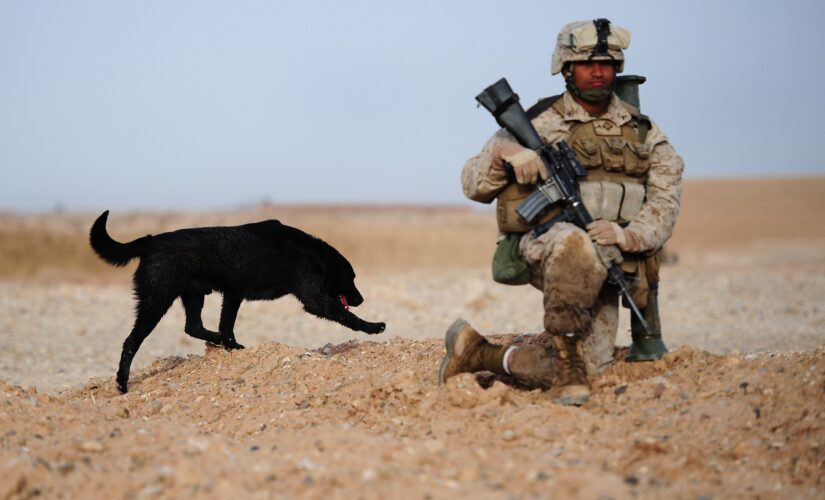The Government Accountability Office this week warned federal agencies that they need better standards in place to ensure the health and welfare of the more than 5,100 working dogs that serve the government.
The GAO is known as the congressional watchdog that helps lawmakers oversee the operation of federal programs. In a report released Wednesday, GAO said departments and agencies across the government need to take better care of animals that help officials detect explosives and narcotics, find missing people, and assist with search and rescue efforts.
The report said standards aimed at preventing abuse and neglect of these dogs are missing in several departments, as are standards for granting them adequate rest periods during the day.
UKRAINE’S PINT-SIZED BOMB-SNIFFING DOG ‘PATRON’ HAS BECOME A HERO, SYMBOL OF HOPE
U.S. Border Patrol agents use a dog to check for drugs at a checkpoint outside Laredo, Texas. (Reuters/Rick Wilking)
“[A]bout half of the federally managed programs do not address abuse and neglect or requirements for rest and duration of on-duty working time in their policies,” GAO said. “Similarly, about half of the contractor-managed programs do not address abuse and neglect or how to handle working dog retirement or euthanasia decisions in their contract-related documents.”
The Department of Homeland and Security, with nearly 3,000 working dogs, is by far the largest employer of animals used to detect drugs and explosives. But many programs under DHS, including some run by U.S. Customs and Border Protection, have no standards in place to prevent abuse and neglect of their dogs.
The Department of Defense is the second-largest employer of working dogs at nearly 1,800, but GAO found the Air Force, Marine Corps and Special Operations Command also have no policies in place related to abuse and neglect.
DOGS IN BOMB-DETECTING HARNESSES HELP NYPD PATROL THE CITY
Bomb sniffer dog Corporal Ace searches for explosives near a U.S. Marine during a patrol in Afghanistan, Jan. 26, 2010.
(AFP Photo/Christophe Simon/AFP via Getty Images)
More than half of the federal programs that use dogs don’t have policies in place related to rest and length of duty. The Air Force, Navy and Special Operations Command were among the service branches within DOD that don’t have these policies in place.
Under DHS, the Secret Service, the Federal Emergency Management Agency and parts of Customs and Border Protection also have no policies in place related to rest and length of duty.
GAO developed 18 standards that should be in place to ensure healthy and safe working environments for dogs used by the federal government, including standards related to food and water, medical care, grooming, sanitation and exercise.
Every federal agency that uses dogs has standards in place for food and water except for the Fish and Wildlife Service’s Office of Law Enforcement.
US MILITARY RANKED ‘WEAK’ FOR FIRST TIME: HERITAGE FOUNDATION REPORT
Army Spc. David Sheriff of the 25th Infantry Division plays with Dagmar, a military working dog, at Al Asad Air Base, Iraq, May 29, 2020. (US Army/Cover Images)
The report is the result of more than two years of work by GAO and led to a broad recommendation that every agency that uses dogs adopt standards in all 18 areas outlined by the report. The investigation concluded in February 2022, and several agencies have said since then that they will adopt these standards or have already taken steps in that direction.
GAO also recommended that the State Department direct officials there to ensure these standards remain in place when working dogs are loaned out to foreign governments and foreign organizations, such as embassy security.
CLICK HERE TO GET THE FOX NEWS APP
The report followed a handful of instances over the past decade that indicated conditions for working dogs need to be improved. In 2019, for example, the State Department’s Office of Inspector General reported “serious animal welfare concerns for working dogs” used in anti-terrorism efforts.
“The Inspector General found that dogs provided to at least one foreign government did not receive proper medical care and, in some cases, dogs were found to be dangerously underweight,” GAO said. “The Inspector General also reported on the death of at least one dog from heat stroke.”




